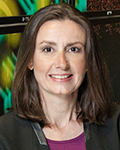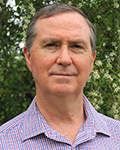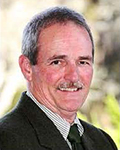

 Karen E. Willcox is Director of the Institute for Computational Engineering and Sciences (ICES) and a Professor of Aerospace Engineering and Engineering Mechanics at the University of Texas at Austin. She holds the W. A. 'Tex' Moncrief, Jr. Chair in Simulation-Based Engineering and Sciences and the Peter O'Donnell, Jr. Centennial Chair in Computing Systems. Before joining ICES in 2018, she spent 17 years as a professor at the Massachusetts Institute of Technology, where she served as the founding Co-Director of the MIT Center for Computational Engineering and the Associate Head of the MIT Department of Aeronautics and Astronautics. Prior to joining the MIT faculty, she worked at Boeing Phantom Works with the Blended-Wing-Body aircraft design group. Her research at MIT has produced scalable computational methods for design of next-generation engineered systems, with a particular focus on model reduction as a way to learn principled approximations from data and on multi-fidelity formulations to leverage multiple sources of uncertain information. She is a Fellow of SIAM and Associate Fellow of AIAA.
Karen E. Willcox is Director of the Institute for Computational Engineering and Sciences (ICES) and a Professor of Aerospace Engineering and Engineering Mechanics at the University of Texas at Austin. She holds the W. A. 'Tex' Moncrief, Jr. Chair in Simulation-Based Engineering and Sciences and the Peter O'Donnell, Jr. Centennial Chair in Computing Systems. Before joining ICES in 2018, she spent 17 years as a professor at the Massachusetts Institute of Technology, where she served as the founding Co-Director of the MIT Center for Computational Engineering and the Associate Head of the MIT Department of Aeronautics and Astronautics. Prior to joining the MIT faculty, she worked at Boeing Phantom Works with the Blended-Wing-Body aircraft design group. Her research at MIT has produced scalable computational methods for design of next-generation engineered systems, with a particular focus on model reduction as a way to learn principled approximations from data and on multi-fidelity formulations to leverage multiple sources of uncertain information. She is a Fellow of SIAM and Associate Fellow of AIAA.
 Paul Lawrence is the Acting Executive Director for Science Delivery and Knowledge in the Queensland Department of Environment and Science. He has over 35 years of experience in land and water processes, modelling, and decision support systems and has participated in national and technical advisory committees in natural resource management, reef water quality, land use planning and soil carbon. He is also the founding Director for the Queensland Water Modelling Network and Chairs the Steering Panel and Core Group. He has a strong interest in multidisciplinary science to inform policy and planning, and proactive in collaborative networks across government, university, industry and the private sectors. He holds a Bachelor and Masters Degrees from Griffith University, and a PhD from the University of Arizona in multiple criteria decision support systems. He has also completed an OECD Post-Doctoral Fellowship and an Executive Masters in Public Administration from Monash University.
Paul Lawrence is the Acting Executive Director for Science Delivery and Knowledge in the Queensland Department of Environment and Science. He has over 35 years of experience in land and water processes, modelling, and decision support systems and has participated in national and technical advisory committees in natural resource management, reef water quality, land use planning and soil carbon. He is also the founding Director for the Queensland Water Modelling Network and Chairs the Steering Panel and Core Group. He has a strong interest in multidisciplinary science to inform policy and planning, and proactive in collaborative networks across government, university, industry and the private sectors. He holds a Bachelor and Masters Degrees from Griffith University, and a PhD from the University of Arizona in multiple criteria decision support systems. He has also completed an OECD Post-Doctoral Fellowship and an Executive Masters in Public Administration from Monash University.
 Tatiana Filatova is Professor of Computational Economic Modeling at the University of Technology Sydney (UTS), Australia, and at the University of Twente, the Netherlands. Her research focuses on understanding where and how individual behavioral changes amplified by social interactions may cause structural changes in coupled socio-environmental systems. When studying these complex adaptive systems, she relies on agent-based computational models combined with behavioral data collection on individual decisions and social networks. Prof. Filatova applies these methods to explore economic impacts of disasters, urban resilience and regional dynamics. This research has been distinguished by a number of international awards and individual grants including the Early career NWO VENI grant and the ERC Starting grant. Professor Filatova is an elected member of the Young Academy (DJA) of the Royal Netherlands Academy of Arts and Sciences (KNAW), and serves as the scientific Program Leader of the Dutch 4TU.Federation strategic research program on resilience of social-technical-environmental systems (DeSIRE).
Tatiana Filatova is Professor of Computational Economic Modeling at the University of Technology Sydney (UTS), Australia, and at the University of Twente, the Netherlands. Her research focuses on understanding where and how individual behavioral changes amplified by social interactions may cause structural changes in coupled socio-environmental systems. When studying these complex adaptive systems, she relies on agent-based computational models combined with behavioral data collection on individual decisions and social networks. Prof. Filatova applies these methods to explore economic impacts of disasters, urban resilience and regional dynamics. This research has been distinguished by a number of international awards and individual grants including the Early career NWO VENI grant and the ERC Starting grant. Professor Filatova is an elected member of the Young Academy (DJA) of the Royal Netherlands Academy of Arts and Sciences (KNAW), and serves as the scientific Program Leader of the Dutch 4TU.Federation strategic research program on resilience of social-technical-environmental systems (DeSIRE).
Web: http://tatianafilatova.weebly.com/ and the UTS PERSWADE Research Center
 Associate Professor Kate O’Brien completed undergraduate degrees in Chemical Engineering and Mathematics at the University of Queensland (UQ) in 1994. She worked as a process engineer in New Zealand before completing her PhD in environmental engineering at the University of Western Australia, returning to UQ as an academic in 2002. Kate currently leads the chemical-environmental program at UQ. She has used mathematical modelling, data analysis and synthesis to provide insight into a wide range of sustainability issues, including greenhouse gas mitigation, the urban energy-water nexus, water quality and eutrophication, resilience of coastal ecosystems and work-family conflict. Kate takes a systems approach to sustainability, working in interdisciplinary teams with colleagues from engineering, ecology, business and social science.
Associate Professor Kate O’Brien completed undergraduate degrees in Chemical Engineering and Mathematics at the University of Queensland (UQ) in 1994. She worked as a process engineer in New Zealand before completing her PhD in environmental engineering at the University of Western Australia, returning to UQ as an academic in 2002. Kate currently leads the chemical-environmental program at UQ. She has used mathematical modelling, data analysis and synthesis to provide insight into a wide range of sustainability issues, including greenhouse gas mitigation, the urban energy-water nexus, water quality and eutrophication, resilience of coastal ecosystems and work-family conflict. Kate takes a systems approach to sustainability, working in interdisciplinary teams with colleagues from engineering, ecology, business and social science.
 Gerald G. Brown, Ph.D., is an Emeritus Distinguished Professor of Operations Research at the Naval Postgraduate School, where he has taught and conducted research in optimization and optimization-based decision support since 1973, earning awards for both outstanding teaching and research. His military research has been applied by every uniformed service, in areas ranging from strategic nuclear targeting to
capital planning. He has been awarded the Barchi, Mennekin, Rist, and Thomas prizes for military operations research, is credited with guiding investments of more than a trillion dollars, and has earned the INFORMS President and Steinhardt Prizes for lifetime achievements. He has designed and implemented decision support software used by the majority of the Fortune 50, in areas ranging from vehicle routing to supply chain optimization. His research has earned patents and appears in scores of open-literature publications and classified reports, some of which are seminal references. Brown is an elected member of the National Academy of Engineering, a recipient of two US Navy Distinguished Civilian Service Medals, and an INFORMS Fellow. Brown is currently a Naval Postgraduate School volunteer who works with faculty in support of Navy education and research missions.
Gerald G. Brown, Ph.D., is an Emeritus Distinguished Professor of Operations Research at the Naval Postgraduate School, where he has taught and conducted research in optimization and optimization-based decision support since 1973, earning awards for both outstanding teaching and research. His military research has been applied by every uniformed service, in areas ranging from strategic nuclear targeting to
capital planning. He has been awarded the Barchi, Mennekin, Rist, and Thomas prizes for military operations research, is credited with guiding investments of more than a trillion dollars, and has earned the INFORMS President and Steinhardt Prizes for lifetime achievements. He has designed and implemented decision support software used by the majority of the Fortune 50, in areas ranging from vehicle routing to supply chain optimization. His research has earned patents and appears in scores of open-literature publications and classified reports, some of which are seminal references. Brown is an elected member of the National Academy of Engineering, a recipient of two US Navy Distinguished Civilian Service Medals, and an INFORMS Fellow. Brown is currently a Naval Postgraduate School volunteer who works with faculty in support of Navy education and research missions.
 Dr Yongqiang Zhang has 20 years experience in hydrological modelling and remote sensing hydrology. He is currently a Distinguished Professor in the Institute of Geographic Sciences and Natural Resources Research, Chinese Academy of Sciences. He worked in CSIRO as the Research Scientist, Senior Research Scientist and Principal Research Scientist in 2006-2018. He is currently the Associate Editor of Journal of Hydrology, the Associate Editor of Journal of Geophysical Research – Atmospheres, the Editorial Board Member of Remote Sensing of Environment. Dr Zhang published 150 peer-review journal papers, with majority published in leading hydrological and water resources journals, and > 60 papers published in the first author and/or corresponding author. He has Google Scholar citations of > 7100 and h-index 41 and ISI Web of Knowledge citations of >4000. He won 12 professional awards, including GN Alexander Medal and Alexandar von Humbdolt Fellowship.
Dr Yongqiang Zhang has 20 years experience in hydrological modelling and remote sensing hydrology. He is currently a Distinguished Professor in the Institute of Geographic Sciences and Natural Resources Research, Chinese Academy of Sciences. He worked in CSIRO as the Research Scientist, Senior Research Scientist and Principal Research Scientist in 2006-2018. He is currently the Associate Editor of Journal of Hydrology, the Associate Editor of Journal of Geophysical Research – Atmospheres, the Editorial Board Member of Remote Sensing of Environment. Dr Zhang published 150 peer-review journal papers, with majority published in leading hydrological and water resources journals, and > 60 papers published in the first author and/or corresponding author. He has Google Scholar citations of > 7100 and h-index 41 and ISI Web of Knowledge citations of >4000. He won 12 professional awards, including GN Alexander Medal and Alexandar von Humbdolt Fellowship.
Supporting evidence-based decision making: the role of modelling and simulation